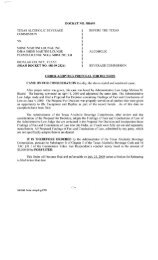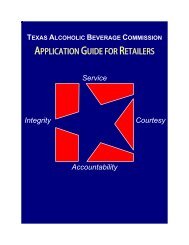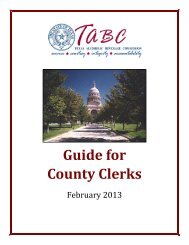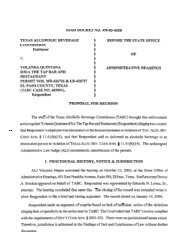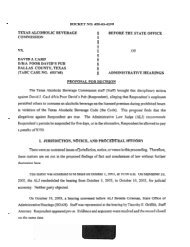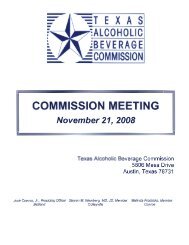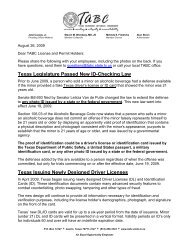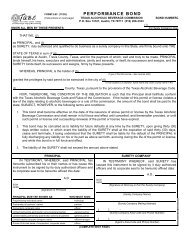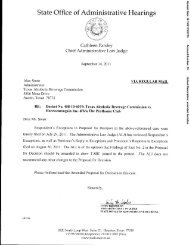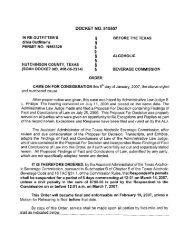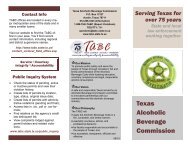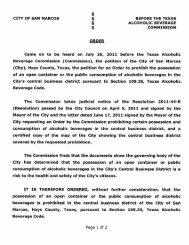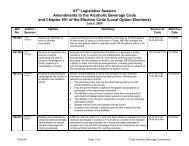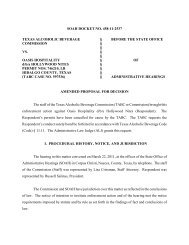TABC Code - Texas Alcoholic Beverage Commission
TABC Code - Texas Alcoholic Beverage Commission
TABC Code - Texas Alcoholic Beverage Commission
Create successful ePaper yourself
Turn your PDF publications into a flip-book with our unique Google optimized e-Paper software.
populace. Massive criminal empires were built on illicit profits from these unlawful activities and<br />
organized crime openly flourished in Chicago, New York, New Orleans, and other cities.<br />
(c) During Prohibition, the illegal enterprises used their national wholesale distribution<br />
networks to exert control over their customers. A common operating procedure was to sell alcoholic<br />
beverages to a speakeasy on liberal terms to ensnarl the owner in a web of debt and control with the aim<br />
of forcing the owner to engage in other illegal business enterprises on the premises including gambling,<br />
prostitution, and the distribution of illegal drugs.<br />
(d) In 1935, when the sale of alcoholic beverages was legalized in this state following the<br />
adoption of the Twenty-first Amendment to the United States Constitution, the state was faced with<br />
building an entire framework for the distribution of alcoholic beverage products. An important concern<br />
was that since criminals owned and controlled the existing illegal alcoholic beverage distribution system,<br />
criminals would attempt to own and control the newly legalized industry. In an effort to prevent this<br />
situation, comprehensive laws were adopted to ensure that an alcoholic beverage permit or license could<br />
be issued only to citizens of the state who had lived in this state for at least three years, thus, long enough<br />
to be known by their community and neighbors.<br />
(e) Under the newly designed regulatory scheme, permits and licenses issued by the state did<br />
not grant the holder a right. Rather, the holder was granted a privilege that could be challenged at both the<br />
county and the state level if the character or qualifications of the applicant were suspect. Finally, strict<br />
cash and credit laws were adopted to prevent parties in the wholesale distribution system from controlling<br />
their retail customers through the leveraging of debt to accomplish other illicit gain.<br />
(f) The alcoholic beverage laws adopted by the legislature in the 1930s to free the industry<br />
from the influence of organized crime have been successful in this state. The alcoholic beverage industry<br />
in this state is not dominated by organized crime. However, the legislature does find that organized crime<br />
continues to be a threat that should never be allowed to establish itself in the alcoholic beverage industry<br />
in this state.<br />
(g) To accommodate the interests of the consuming public, the expansion of popular<br />
nationwide businesses, and the increasing state interest in tourism, and at the same time to guard against<br />
the threats of organized crime, unfair competition, and decreased opportunities for small businesses, the<br />
legislature finds that there is no longer need for the three-year residency requirements with regard to those<br />
segments of the industry that sell alcoholic beverages to the ultimate consumer only. The legislature finds<br />
that it is desirable to retain a one-year residency requirement for businesses that sell to the consumer<br />
packaged liquor and fortified wine capable of being used to supply legal or illegal bars and clubs. The<br />
legislature also finds it reasonable, desirable, and in the best interests of the state to provide a one-year<br />
residency requirement for businesses engaged in the wholesale distribution of beer, malt liquor, or wine<br />
or in the manufacture and distribution of distilled spirits and fortified wines at both the wholesale and the<br />
retail levels where those beverages, in unopened containers, are sold to mixed beverage permittees and<br />
private club registration permittees as well as to the general public. Adequate protection is deemed to be<br />
provided by controlling those sources of supply for distilled spirits and fortified wines.<br />
(h) It is also the public policy of this state and a purpose of this section to enforce strict cash<br />
and credit laws as a means of preventing those engaged in the distribution of alcoholic beverages from<br />
exerting undue influence over any level of the industry selling or serving alcoholic beverages to the<br />
ultimate consumer.<br />
(i) It is also the public policy of this state and a purpose of this section to maintain and<br />
enforce the three-tier system (strict separation between the manufacturing, wholesaling, and retailing<br />
levels of the industry) and thereby to prevent the creation or maintenance of a "tied house" as described<br />
and prohibited in Section 102.01 of this code.<br />
(j) The above-stated public policies, purposes of this section, and legislative findings are<br />
provided as guidelines for the construction of the following subsections of this section.<br />
(k) A requirement under this code that 51 percent or more of the stock of a corporation be<br />
owned by a person or persons who were citizens of this state for a one-year period preceding the date of<br />
the filing of an application for a license or permit does not apply to a corporation organized under the<br />
<strong>Texas</strong> <strong>Alcoholic</strong> <strong>Beverage</strong> <strong>Code</strong> (2009) 18



